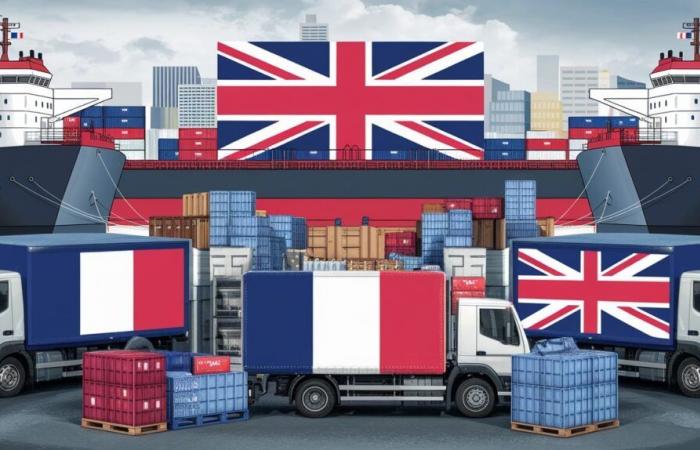Has Brexit signaled the end of thriving trade between France and the United Kingdom? An exclusive study by French customs lifts the veil on the evolution of trade since this historic divorce. The results are…
Almost four years after the formalization of Brexit, what assessment can we draw from trade between France and the United Kingdom? This is the question that the ministerial statistical service of French customs tried to answer in a study published this Friday. Its conclusions will surprise no one: Brexit has indeed weighed on the flow of goods between the two countries, particularly since the return of customs barriers in 2021.
The number of French importers in free fall
First alarming observation: the number of French companies importing goods from the United Kingdom fell by 34% between 2018 and 2023. A spectacular collapse which testifies to the sudden brake on trade caused by the new post-Brexit administrative formalities. On the export side, the decline is less marked but still significant, with a decline of 6% over the same period.
On a European scale, the diagnosis is similar. The United Kingdom’s share of EU foreign trade has continued to decline, falling from 52% to 40% for imports and from 46% to 41% for exports between 2018 and 2023. London certainly remains the second customer and third supplier of the European bloc, but its relative weight has been considerably reduced.
A postponement of trade to other countries
At the same time as this decline, the British seem to have partly redirected their foreign trade towards third countries, first and foremost China and the United States. Their share of United Kingdom imports increased by 3 points over the period, a particularly marked increase for certain products such as telecommunications equipment or computer equipment.
The only notable exception to this rather gloomy picture: France. While the share of British imports declined for most European countries, it remained stable at 3.7% for France. A phenomenon that customs paradoxically attributes… to Brexit itself!
France, a post-Brexit “quasi-transit zone”
With the return of customs formalities, many British companies have chosen to make their import declarations in France, before reshipping their goods to other EU countries. Our territory has thus become a “quasi-transit zone”, which has had the effect of artificially inflating bilateral trade figures.
This phenomenon explains most of the deterioration in France’s trade balance with the United Kingdom, which fell by 2.5 billion euros between 2018 and 2023.
French customs statistical service
Despite everything, France’s trade surplus vis-à-vis the United Kingdom remains substantial, at 9.6 billion euros in 2023. It even remains “the first trade surplus recorded by France”, underlines the study.
What future for Franco-British trade?
If Brexit has undoubtedly dealt a blow to the privileged commercial relationship between France and the United Kingdom, all hope is not lost. The British government is stepping up initiatives to facilitate trade, as evidenced by the recent visit to Paris by Secretary of State for Foreign Affairs David Lammy.
Certain strategic sectors, such as energy or defense, also offer promising prospects for cooperation. But it will undoubtedly take several more years for businesses to fully adapt to the new post-Brexit trade framework and for Franco-British trade to regain its former glory.
One thing is certain: despite the obstacles, the geographic proximity and historical ties that unite the two countries should make it possible to maintain close economic relations. The challenge, for Paris as for London, will be to find a new model of partnership, both pragmatic and ambitious.






